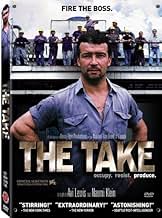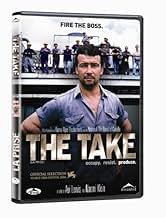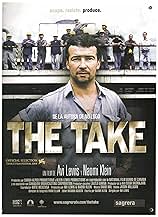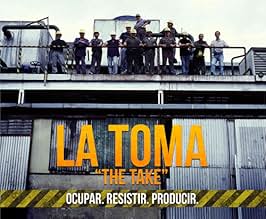VALUTAZIONE IMDb
7,6/10
1237
LA TUA VALUTAZIONE
Aggiungi una trama nella tua linguaIn the wake of Argentina's economics collapse of 2001, factory workers break into abandoned factories and restart production. Could these pioneers of cooperative ownership be a model for reb... Leggi tuttoIn the wake of Argentina's economics collapse of 2001, factory workers break into abandoned factories and restart production. Could these pioneers of cooperative ownership be a model for rebuilding Argentina's economy?In the wake of Argentina's economics collapse of 2001, factory workers break into abandoned factories and restart production. Could these pioneers of cooperative ownership be a model for rebuilding Argentina's economy?
- Regia
- Sceneggiatura
- Star
- Premi
- 1 vittoria e 5 candidature totali
Bill Clinton
- Self
- (filmato d'archivio)
Gustavo Cordera
- Self (singer)
- (as Bersuit)
Carlos Saúl Menem
- Self
- (as Carlos Menem)
Juan Domingo Perón
- Self
- (filmato d'archivio)
Recensioni in evidenza
The Take is perhaps one of the most inspirational films I had ever seen. It provides an example to all of us - in terms of what we could accomplish if only we came together, if only we joined hands like those grandmothers in the streets of Argentina, like those workers who took production and decision making into their own hands. True democracy has to start from the bottom up, it has to start in the family, in the school, in the workplace, in the neighborhood and expand outward from there. Only when decisions in *all of these* social settings are made democratically, based on majority vote, only then, can our society begin to call itself democratic. This is currently not the case in the United States. It is not the case in the US family, nor in US schools, and no where is it more untrue than in the US workplace. Currently in the United States practically all decisions are made by those in power, by those with the money, and enforced on those underneath. When somebody gets fired from a workplace, do all the workers get together and vote on whether the person should be kept or fired? Do the children in the US schools have any democratic power to decide how things are done and organized? Do wives have equal power with their husbands in the American family? So how can a society that is so undemocratic claim to be a model of democracy for others? It is unfortunate that in the US democratic participation is limited to electing individuals to power, and is never directly related to policy issues. Our society would be much more democratic if we voted like specifically on the questions at hand both at the national and at the local level: REFERENDUM: Should US troops remain in Iraq? Should gay marriage be legal? Etc. All the questions that are most important to us, why don't we just vote specifically on them? The movie about Argentine factory workers has a message about democracy: "We vote often, that way we get used to loosing". If we were to vote more often, and to vote specifically on the issues that are important to us, then we would have a true participatory democratic society. So the Take, in my opinion is *a very important* film, and is something that all workers around the world and all people should learn from.
Some other comments I have about the Take are as follows. -By taking over Argentine factories, the workers are benefiting not only themselves and their families, but also their communities and Argentina as a whole, by contributing to economic recovery. I think this is a very important point. - It is unclear to me how the workers were able to make the factories profitable again, despite the economic crush. Because generally, when an economic collapse takes place and people lose jobs and savings, the demand for new goods declines, and that is probably why the factory owners were forced to shut down their factories in the first place. So how are the workers able to sell off their final products after taking over production? Is there some kind of barter system in place? Are the workers getting their inputs domestically instead of by importing them? I wish the film explained this. -The issue of private property is raised in the film. Should people really have the right to own stuff if they are not making good use of it? I mean, like if you are a kid with a toy, and you aren't playing with your toy, and the kids next to you want to borrow your toys because they actually want to play together, shouldn't you just give it to them, since you are not using it anyway? I mean why is the law on the side of those who want to keep their toys to themselves and do nothing with it?
Some other comments I have about the Take are as follows. -By taking over Argentine factories, the workers are benefiting not only themselves and their families, but also their communities and Argentina as a whole, by contributing to economic recovery. I think this is a very important point. - It is unclear to me how the workers were able to make the factories profitable again, despite the economic crush. Because generally, when an economic collapse takes place and people lose jobs and savings, the demand for new goods declines, and that is probably why the factory owners were forced to shut down their factories in the first place. So how are the workers able to sell off their final products after taking over production? Is there some kind of barter system in place? Are the workers getting their inputs domestically instead of by importing them? I wish the film explained this. -The issue of private property is raised in the film. Should people really have the right to own stuff if they are not making good use of it? I mean, like if you are a kid with a toy, and you aren't playing with your toy, and the kids next to you want to borrow your toys because they actually want to play together, shouldn't you just give it to them, since you are not using it anyway? I mean why is the law on the side of those who want to keep their toys to themselves and do nothing with it?
This movie helps progressive people address one of the main criticisms of the right and capitalists: what would you do differently if capitalism and globalization is so bad?
Argentina was a country where public utilities had been sold off and money fled the country. Factories were left empty, owing millions of dollars in taxes to various levels of government. The workers thought: we don't have jobs, so we can't buy things for our families. There are no jobs, because people aren't buying things for their families. So they broke the cycle, and with government approval (eventually) occupied the factories and just started producing items for themselves and their neighbors. The co-operative/collectivist movement in Argentina flourished.
The movie shows it was far from easy, and there are many hurdles left to overcome for this country and its people. But it's a hopeful message that if you buy locally, use locally produced services and products produced "locally", you create a viable economic cycle that enriches everybody. You may not have $40 microwaves produced someplace else on the other side of the world, but instead you get a quality product produced by your neighbour, that doesn't require the expense and waste of trans-global shipment. Then, the makers of cheap microwaves will be forced to pay their workers more in order to create a local/national market for their products, rather than using slave labour and shipping the products overseas to the "first world".
Okay, I'm off my soap box. Well done movie with real emotion and appeal.
Argentina was a country where public utilities had been sold off and money fled the country. Factories were left empty, owing millions of dollars in taxes to various levels of government. The workers thought: we don't have jobs, so we can't buy things for our families. There are no jobs, because people aren't buying things for their families. So they broke the cycle, and with government approval (eventually) occupied the factories and just started producing items for themselves and their neighbors. The co-operative/collectivist movement in Argentina flourished.
The movie shows it was far from easy, and there are many hurdles left to overcome for this country and its people. But it's a hopeful message that if you buy locally, use locally produced services and products produced "locally", you create a viable economic cycle that enriches everybody. You may not have $40 microwaves produced someplace else on the other side of the world, but instead you get a quality product produced by your neighbour, that doesn't require the expense and waste of trans-global shipment. Then, the makers of cheap microwaves will be forced to pay their workers more in order to create a local/national market for their products, rather than using slave labour and shipping the products overseas to the "first world".
Okay, I'm off my soap box. Well done movie with real emotion and appeal.
This documentary is the real "Yes, We Can", only instead of an empty political statement it's a true demonstration of "How You Can" make a real change.
When someone tells you that an enterprise cannot run without a boss and a hierarchy of power, don't believe them. Just let them watch "The Take" (La Toma) and see how it's possible to replace the "hierarchy of power" with a "network of cooperation". At first, I didn't believe it myself, but now I know it's possible. Imagine workers cooperating and taking decisions by voting, effectively managing a successful enterprise. Even if the people are inexperienced at first, even if they disagree sometimes, things can be worked out.
"The Take" simply shows something that Capitalism says cannot exist, something that's supposedly impossible: people cooperating for a common purpose, dividing profits equally, taking decisions democratically and managing the enterprise successfully. No leaders, no power struggles, just cooperation. The incentive is the common success, not just personal gain.
"The Take" is even more topical today in the so-called Global financial crisis, because it poses the question: "what should happen to a failed business? Should it be bailed out by the people only to repeat the same mistakes again? Should it be liquidated and sold for scrap metal, leaving the workers without jobs? Or should everything start anew, but this time as a democratic cooperation between workers?" So next time a business fails and the government decides to take your money to save a corporation, know that you have the right to say "NO, I deserve to be compensated. Your factory will do nicely."
I simply cannot express how inspiring and eye-opening this documentary is, you just have to see it for yourself.
When someone tells you that an enterprise cannot run without a boss and a hierarchy of power, don't believe them. Just let them watch "The Take" (La Toma) and see how it's possible to replace the "hierarchy of power" with a "network of cooperation". At first, I didn't believe it myself, but now I know it's possible. Imagine workers cooperating and taking decisions by voting, effectively managing a successful enterprise. Even if the people are inexperienced at first, even if they disagree sometimes, things can be worked out.
"The Take" simply shows something that Capitalism says cannot exist, something that's supposedly impossible: people cooperating for a common purpose, dividing profits equally, taking decisions democratically and managing the enterprise successfully. No leaders, no power struggles, just cooperation. The incentive is the common success, not just personal gain.
"The Take" is even more topical today in the so-called Global financial crisis, because it poses the question: "what should happen to a failed business? Should it be bailed out by the people only to repeat the same mistakes again? Should it be liquidated and sold for scrap metal, leaving the workers without jobs? Or should everything start anew, but this time as a democratic cooperation between workers?" So next time a business fails and the government decides to take your money to save a corporation, know that you have the right to say "NO, I deserve to be compensated. Your factory will do nicely."
I simply cannot express how inspiring and eye-opening this documentary is, you just have to see it for yourself.
No one is more rad-chic than Naomi Klein, with her cool war-resister parents, alternative doctor father and militant feminist mother. She crossed Canada at 16 years old campaigning against nuclear power and wrote a hit book attacking globalisation in her 20s.
Now she has made a feel-good movie out of the economic catastrophe that hit Argentina, by following the weary campaign of unemployed steel workers to join a couple of hundred other factory occupations and take control of their abandoned steel works.
Klein and spouse Avi Lewis were in Argentina for some six months, with a crew of 16 and a budget of about C$1m, so we could certainly expect results. Whether this resounding endorsement of worker co-ops (slogan: Fire The Boss) is quite what the NFB had in mind is not clear.
At a couple of points, I felt the film ruined Argentina offered was about the repulsive imp Carlos Menem and the murderous bourgeois traitors he represented. Who is going to purge those secret policemen who rubbed out some 30,000 lefties? When are those generals going to face a court? Why was Menem not in prison instead of running for president? But the survival tactics of the workers on the ground was a more humane story, and that is to Klein's credit.
Now she has made a feel-good movie out of the economic catastrophe that hit Argentina, by following the weary campaign of unemployed steel workers to join a couple of hundred other factory occupations and take control of their abandoned steel works.
Klein and spouse Avi Lewis were in Argentina for some six months, with a crew of 16 and a budget of about C$1m, so we could certainly expect results. Whether this resounding endorsement of worker co-ops (slogan: Fire The Boss) is quite what the NFB had in mind is not clear.
At a couple of points, I felt the film ruined Argentina offered was about the repulsive imp Carlos Menem and the murderous bourgeois traitors he represented. Who is going to purge those secret policemen who rubbed out some 30,000 lefties? When are those generals going to face a court? Why was Menem not in prison instead of running for president? But the survival tactics of the workers on the ground was a more humane story, and that is to Klein's credit.
For folks of the leftist persuasion there's not really been a lot of cheerful stuff in the news for the past decade or three. The trouble with normal, as they say, is that it always gets worse. Most political documentaries are the same way -- something terrible is happening, the polemical narrator assures us, and other than the go-out-and-do-something last ten minutes of the film things are kind of universally bleak.
The Take opposes all of that, and is the rare piece of media in which the revolution is not just a vague series of values but an actual practise, made up mostly of hard work and disagreement, but moving forward in a positive direction nonetheless. Avi Lewis and Naomi Klein aren't the slickest filmmakers in the world, but they know enough to get out of the way and let the incredible story before them unfold. One of the few documentaries -- one of the few films period -- that I've left feeling genuine hope, this is a must-see for anyone who believes (or wants to believe) that another world is possible.
The Take opposes all of that, and is the rare piece of media in which the revolution is not just a vague series of values but an actual practise, made up mostly of hard work and disagreement, but moving forward in a positive direction nonetheless. Avi Lewis and Naomi Klein aren't the slickest filmmakers in the world, but they know enough to get out of the way and let the incredible story before them unfold. One of the few documentaries -- one of the few films period -- that I've left feeling genuine hope, this is a must-see for anyone who believes (or wants to believe) that another world is possible.
I più visti
Accedi per valutare e creare un elenco di titoli salvati per ottenere consigli personalizzati
Dettagli
- Data di uscita
- Paesi di origine
- Siti ufficiali
- Lingue
- Celebre anche come
- Захват
- Luoghi delle riprese
- Aziende produttrici
- Vedi altri crediti dell’azienda su IMDbPro
Botteghino
- Lordo Stati Uniti e Canada
- 30.380 USD
- Fine settimana di apertura Stati Uniti e Canada
- 8625 USD
- 26 set 2004
- Lordo in tutto il mondo
- 30.380 USD
- Tempo di esecuzione1 ora 27 minuti
- Colore
Contribuisci a questa pagina
Suggerisci una modifica o aggiungi i contenuti mancanti























